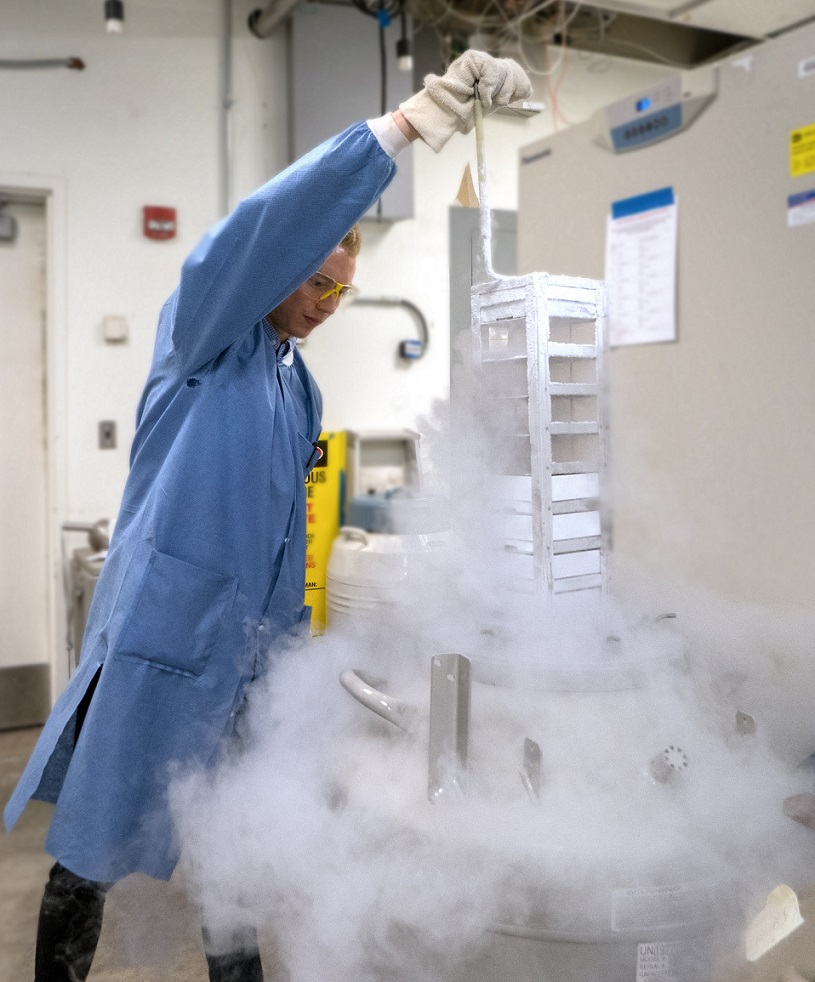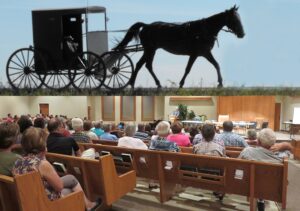The Mennonite Game—tracing the genealogy of a new acquaintance until finding a common ancestor—might be a fun pastime for people with Mennonite backgrounds, but their relatively shallow gene pool is also helpful for understanding the neurobiology behind bipolar disorder.
In the United States, an ongoing National Institute of Mental Health (NIMH) study is enlisting the participation of people of Anabaptist heritage, such as Eastern Mennonite University alumna Bev Miller, who have or are related to people with bipolar disorder. Also known as manic-depressive illness, it tends to run in families.
Miller, who lives in Wauseon, Ohio, is one of the study’s nearly 1,000 participants, many of whom live in areas of the United States highly populated by Mennonites such as Holmes County, Ohio. The study also includes participants from Mennonite communities in Brazil and Canada.
Four decades ago as a young adult, Miller learned she had bipolar disorder when manic episodes and deep depression abruptly ended her teaching career and led to multiple extended hospitalizations. She now manages her illness with medication, which she expects to be taking for the rest of her life.
“But it’s a good life,” she told the Archbold Buckeye.
In recent years, she has deliberately shared her story publicly as an offering of hope to others struggling with the disorder. Her openness has been met with much appreciation and has allowed others, too, to share, she said.
Miller also promotes participation in the NIMH study. Understanding the genetic roots of the disorder has given her a sense of peace (that she did not cause her illness) and a sense of mission: Through the NIMH study, the examination of her genetics and those of her fellow people of Anabaptist descent can contribute to its cure.
As she has written in an article for The Mennonite, “Success of this study will not only serve our denomination but will be a gift to the world.”
For the study, less is more
There isn’t sufficient data to say whether the disorder, which affects approximately two percent of the general population, is more or less prevalent among Anabaptists, said Dr. Francis McMahon, chief of the NIMH Intramural Research Program’s Human Genetics Branch.
However, it is very clear that genes are the major cause, McMahon said. About three-quarters of the risk for bipolar disorder can be explained by genes inherited in families. But there are many such genes, and the story is very complex. People whose families have historically been part of Anabaptist groups such as the Amish or Mennonites have something special to offer researchers: reduced genetic complexity compared to the general population.
The NIMH study is not the first to look at bipolar disorder in Mennonites and Amish. EMU alumnus Dr. Abram Hostetter researched the disease in Amish for four decades beginning in the 1970s.
About 30 genetic markers point to genes contributing to brain biology and development, and “everyone’s got a handful” of the genetic variations associated with bipolar disorder, McMahon said.
But many Anabaptists share common ancestors, and those ancestors at times experienced population bottlenecks such as when a portion of a group escaped persecution and resettled elsewhere, or when a group split and began new, distinct communities that then perpetuated a particular genetic code.
Because these populations’ genetic codes have fewer variants overall, the variants that may be more prevalent in people with bipolar disorder may be more easily identified through genome sequencing.
Another plus of working with these populations is their lower rates of substance use, which can interfere with the accurate diagnosis of the disorder in the first place, McMahon said.
Those qualities “make the problem a little bit simpler,” McMahon said. “So far we have no definitive findings, but we have identified a number of genetic variants that do seem to be more common in people with the illness, and we’re now working on collecting more people who carry those variants as a way to establish statistical proof of the association.”
In addition to examining the genetic codes of participants’ blood or skin samples, McMahon can reprogram the samples into brain cells known as glia, which can then be subjected to test treatments using a variety of medications.
This could lead to more targetable medical responses to bipolar disorder, or even result in a cure.
Getting involved
Participation in the study does not require a bipolar diagnosis; the researchers are also willing to screen people who think they might have it, or who have relatives with a positive diagnosis.
“We find that very often, the same genes express themselves in different ways among relatives, so some people who carry the gene might have a severe form of bipolar disorder, some might have another illness such as depression or anxiety, and others might be perfectly fine,” McMahon said. “We don’t yet quite understand why it is that there’s such a range of different ways in which these genes can act in different individuals, but that’s one of the things we hope to understand through this study.”
Participants in the study can also learn about their genetic predisposition to other conditions, such as heart disease or cancer, and can be helped to connect with mental health providers in their communities if needed.
McMahon and his team of researchers typically meet with eligible participants in their homes to complete a psychiatric history and psychological testing, and collect a skin and blood sample. Continued participation beyond that initial visit is optional.
“We’ve been really very honored and gratified by the number of families that have been willing to invite us into their homes, to give us hours of their time, and to introduce us to their relatives,” said McMahon.
Miller hopes that even more will do so, she said: “It’s one thing Mennonites can do for the rest of the world.”
See more information about the study here.










Leave a Reply
You must be logged in to post a comment.